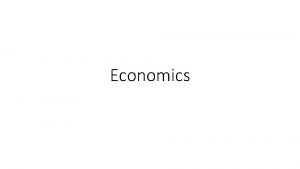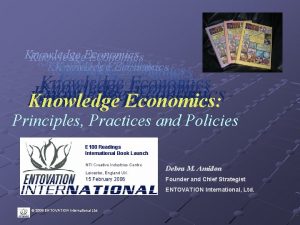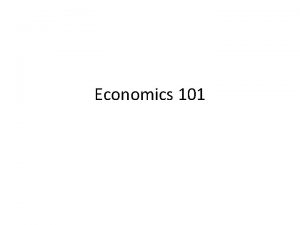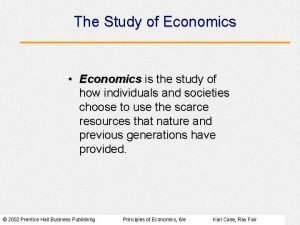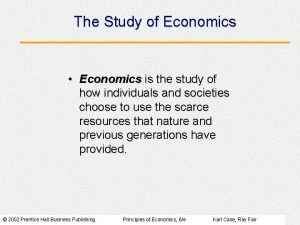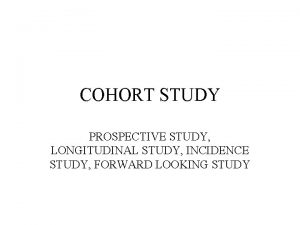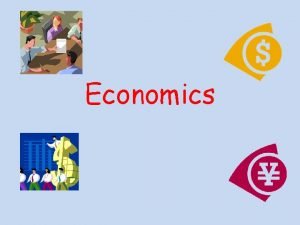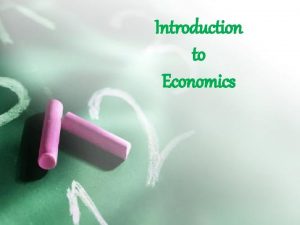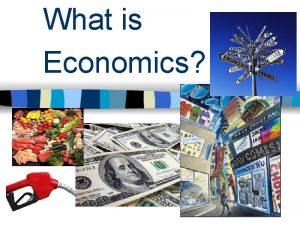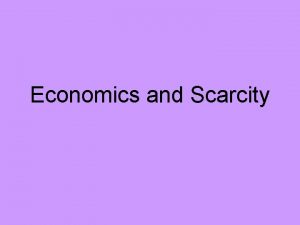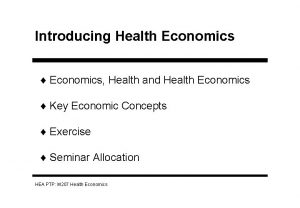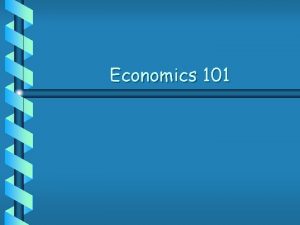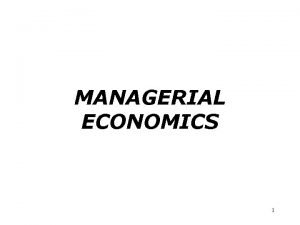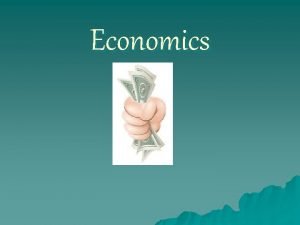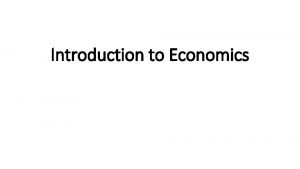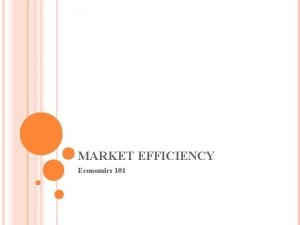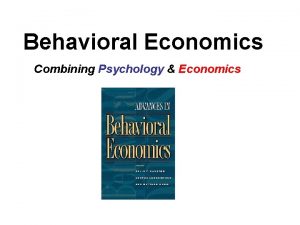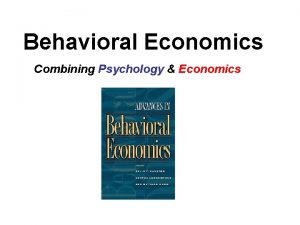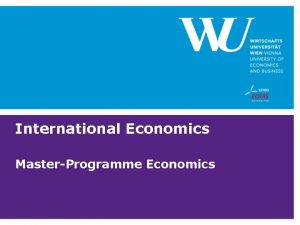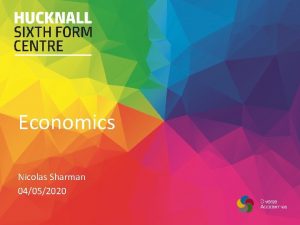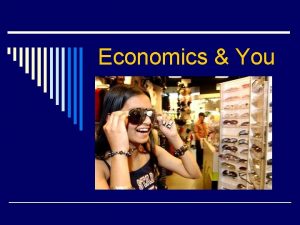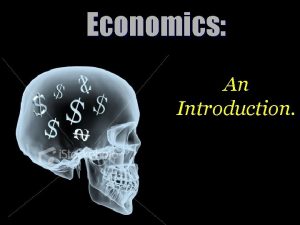Economics What is Economics Economics the study of
























- Slides: 24

Economics

What is Economics? �Economics – the study of production, consumption, and sales of products. �Economy - is how people distribute scarce resources to produce various commodities (products) and how those commodities are distributed for societal consumption

Impact of Economics § in a stable and expansive economy, people will spend more and have more jobs opportunities § in an unstable and slow economy, unemployment rates will be high and jobs will be harder to find �What do you think? � Write down how economics might affect your future career.

Economic Resources • • Resources are anything used to make goods or services, also called factors of production They are scarce and cannot meet all human wants or needs human necessities § include goods and services we cannot live without human wants § include every other type of goods and services we may want but do not need examples: § need: open heart surgery § want: liposuction

Four Factors of Production 1. Land 2. Labor 3. human resources includes all people who work within an economy Capital 4. natural resources found on earth or seas monetary resources needed to start and operate a business goods used in the production process Entrepreneurship involves human skills required to start and run a business organizes the other three factors to create economic goods and services

Types of Economic Systems

Communism A political and economic system in which the major productive resources in a society—such as mines, factories, and farms—are owned by the public or the state, and wealth is divided among citizens equally or according to individual need.

Socialism An economic theory of social organization that believes that the means of making, moving, and trading wealth should be owned or controlled by the community as a whole. In Marxist theory, it is a transitional (temporary, in between) social state between capitalism and communism.

Capitalism An economic system in which the means of production and distribution are privately or corporately owned and the operations are funded by profits.

Basic Economic Systems Capitalism - USA Socialism – everyone works according to his/her ability. Everyone is given what he/she needs according to his/her contribution. Communism – everyone works according to his/ her ability. Everyone is given what he/she needs no matter how he/she contributed.

Capitalism a way of organizing an economy so that the things that are used to make and transport products (such as land, oil, factories, ships, etc. ) are owned by individual people and companies rather than by the government http: //www. learnersdictionary. com/search/capitalis m

Basic Principals of Capitalism Free Enterprise System - An economic system where few restrictions are placed on business activities and ownership.

Freedom of Ownership Citizens who live under a free enterprise system are free to own personal property. Intellectual property – ideas. You must get a patent in the U. S. to protect your property. The use of patented material requires permission from the owner. What does this mean? !? !!? !? !

Example If you want to make a shirt to advertise something but you wanted to use a logo, you would have to get permission. Please buy y soup!!!

Competition is the fueling force behind the free enterprise system. Without competition in the marketplace, there would be no incentive to develop a better and more of a cutting edge product. Without competitions we have a monopolies are bad! and

Price Competition �The focus of the sale price of a product. �The thought is that if everything about the product is equal in two different stores, the customer is going to buy the product that is less expensive.

Non-price Competition �Quality, Service, Financing

Monopoly A company with EXCLUSIVE control over a product or a piece of the market. Examples: local cable service, local water services, electric companies used to be Monopolies are not permitted in free enterprise because they stop competition.

Risk vs. Reward �Risk implies the potential for loss or failure. �Reward is the benefits reaped. Companies must calculate whether or not the risk is worth the reward.

Key Terms �Supply – the AMOUNT of goods producers are willing to make and sell. �Demand – the consumers WILLINGNESS and ABILITY to buy products �Surplus – supply exceeds (>) demand. �Shortage – demands exceeds (>) supply. �Equilibrium- supply = demand

Determine Prices

Role of Consumer Deciding which businesses survive Determining prices

Business Survival Consumers keep businesses in business. How? !? !

Journal 1 paragraph, 4 sentences What are some examples of a company taking risks? Why might a company take risks even though they know they may lose money? How does capitalism and the free market promote companies taking risks?
 Hình ảnh bộ gõ cơ thể búng tay
Hình ảnh bộ gõ cơ thể búng tay Ng-html
Ng-html Bổ thể
Bổ thể Tỉ lệ cơ thể trẻ em
Tỉ lệ cơ thể trẻ em Voi kéo gỗ như thế nào
Voi kéo gỗ như thế nào Thang điểm glasgow
Thang điểm glasgow Alleluia hat len nguoi oi
Alleluia hat len nguoi oi Môn thể thao bắt đầu bằng chữ f
Môn thể thao bắt đầu bằng chữ f Thế nào là hệ số cao nhất
Thế nào là hệ số cao nhất Các châu lục và đại dương trên thế giới
Các châu lục và đại dương trên thế giới Cong thức tính động năng
Cong thức tính động năng Trời xanh đây là của chúng ta thể thơ
Trời xanh đây là của chúng ta thể thơ Mật thư anh em như thể tay chân
Mật thư anh em như thể tay chân Phép trừ bù
Phép trừ bù Phản ứng thế ankan
Phản ứng thế ankan Các châu lục và đại dương trên thế giới
Các châu lục và đại dương trên thế giới Thể thơ truyền thống
Thể thơ truyền thống Quá trình desamine hóa có thể tạo ra
Quá trình desamine hóa có thể tạo ra Một số thể thơ truyền thống
Một số thể thơ truyền thống Cái miệng nó xinh thế
Cái miệng nó xinh thế Vẽ hình chiếu vuông góc của vật thể sau
Vẽ hình chiếu vuông góc của vật thể sau Nguyên nhân của sự mỏi cơ sinh 8
Nguyên nhân của sự mỏi cơ sinh 8 đặc điểm cơ thể của người tối cổ
đặc điểm cơ thể của người tối cổ V cc
V cc Vẽ hình chiếu đứng bằng cạnh của vật thể
Vẽ hình chiếu đứng bằng cạnh của vật thể

























